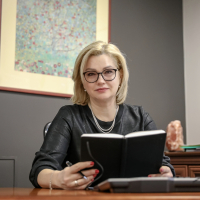2013
- In the Jūrmala Vocational Secondary School was developed two new education programmes: "Material production technologies and products manufacturing" and "Technologies of sewn products manufacturing" with qualification "Auxiliary seamstress".
- 12 education programmes accredited in Jūrmala Vocational Secondary School:
- vocational secondary education programmes – Computer systems with qualification "Computer System Technician" and Comercial Sciences with qualification "Commercial Employee of Indstry";
- vocational education programmes – Catering services with qualification "Cook", Electrical equipment and electronics with qualification "Electrical equipment assembler" and Accounting with qualification "Accountant”;
- vocational primary education programmes – Catering services with qualification "Cook's assistant", "Technologies of sewn products manufacturing" with qualification "Auxiliary seamstress" and Comercial Sciences with qualification "Trade room employee";
- continuing vocational education programmes – Household with qualification "Laundry washing and ironing", Accounting with qualification "Accountant” and Computer using with qualification "Data entry operator";
- vocational development education programmes – Material manufacturing technologies and manufacture of products "Imprint technologies".
2012
- Was started the coordination of long-term social care and social rehabilitation rows and coordination of social rehabilitation for addicted adults and children, and coordination of social rehabilitation for victims of trafficking.
- Developed and licensed 2 new education programmes in Jūrmala Vocational Secondary School - Comercial Sciences with qualification "Trade room employee" and Household with qualification "Laundry washing and ironing".
- In the framework of ERAF project in Slokas Street 61 was created two electronics classrooms and one practice room - Laundry.
- In the framework of KPFI project warming of the premises of service hostel was carried out, but in the Dubultu prospekts 71 was carried out solar collectors installation for hot water preparation.
2011
- In order to improve the quality and accessibility of educational services, the adaptation of five educational programmes ("Marketing and Taxes", "Human resource", "Accounting and Taxes", "Management of hotel services" and "Comercial Sciences", qualification "Commercial Employee of Indstry") was carried out to the needs of the distance learning process.
- In order to improve the environment, renovation of the building on Slokas Street 68 (warming of the building, changing windows, floorings and ventilation systems, renovating 6 sanitary units), expanding and adapting the teaching kitchen and canteen for persons with disabilities.
2010
- Improved video conferencing and distance learning system "Moodle", which ensure the exchange of communications and materials between teachers and learners in the e - environment.
- In Dubultu prospekts 71 has been carried out a room renovation, resulting in 60 new numbers of which 22 numbers are adapted to persons with different functional disorders - motion disorders, hearing and visual disorders. Water healing, medicated baths and underwater massage procedures premises has been equiped with stationary hoists allowing the provision of services without restriction to persons with severe mobility disorders, also has been improved working conditions for medical staff, avoiding weight lifting overloads.
- Has been purchased new Medical equipment and has been started new physical therapy services: salt therapy, steam bath, lymphodrainaging boots, sling therapy and gym.
- Was started rehabilitation services for National Armed Forces soldiers after mission.
2009
Was carried out reconstruction work on Slokas street 68 in which was made the ramp for clients in wheelchairs. In the service hotel has been repaired 27 rooms, including 20 premises were adapted for persons in wheelchairs.
2008
From 12 of April the name of State Agency "Socian Integration Centre" has been changed to Social Integration State Agency.
2006 - 2007
Established support points in Latvia.
2005
Together with 11 national and 5 foreign partners, Social Integration Centre launches EQUAL project "Promoting the employment of disabled persons".
2004
Combaining the College RRC and State health centre "Jaundubulti", was created the State Agency "Social Integration Centre".
2003
Accredited all study programmes and College in general.
2002
Name change - College RRC.
2001
In collaboration with Jūrmala City Council, reveals the Daily Centre for persons with mental disorders.
2000
Opening a new Training building in Dubulti, Slokas street 61.
1999
RRC participates in the European Union Phare programme "Business Education Reform in Latvia" implemented by the Ministry of Education and Science and launches the implementation of College programmes.
1998
RRC starts to implement education programmes in distance learning.
1995
Opening a new Training building in Dubulti, in the presence of the Minister of Labour and Social Security of the Federal Republic of Germany dr. N.Blūms and Minister of Welfare of the Latvia - A.Bērziņš.
1992
Minister of Welfare of the Republic of Latvia and Minister of Labour and Social Security of the Federal Republic of Germany signed a contract regarding assistance in establishing a representative vocational rehabilitation centre in Latvia. RRC opens two specialities training classes in Ķemeri.
1991
The Council of Ministers of the Republic of Latvia took a decision No. 252 on the establishment of a Rehabilitation Centre for the Republic (RRC).



